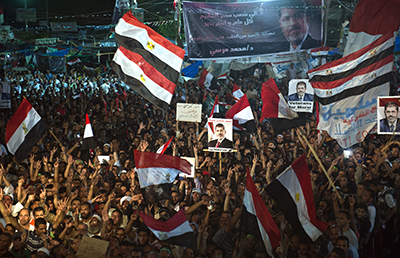New York, August 13, 2013–At least four journalists have been attacked, threatened, or obstructed while covering sit-ins held by supporters of the Muslim Brotherhood in Egypt, according to news reports. The sit-ins began in the lead-up to the ouster of former President Mohamed Morsi, the reports said.
“The Muslim Brotherhood must send a clear signal to all its members and supporters that journalists must be allowed to cover their demonstrations and activities without fear for their safety,” said CPJ Deputy Director Robert Mahoney. “All political groups in Egypt have a duty to ensure the safety of journalists and indeed must go a step further by ensuring that journalists can work freely at this critical time.”
Mohammed Momtaz, an editor for the news website Veto, said that apparent Morsi supporters abducted him on August 9 while he was covering a march in Giza that was headed to the sit-in at Nahda Square, according to the website.
Momtaz said his abductors took him in a car to Nahda Square, where assailants beat him, photographed him naked, and threatened to publish the photographs, he told Al-Youm Al-Saba’a. He was released a few hours later, he said. Veto later published photos and videos that showed bruises and contusions on Momtaz’s face and body.
On the same day, another journalist, Aya Hassan, a video editor for Al-Youm Al-Saba’a, also reported being detained and attacked by supporters of the Muslim Brotherhood while covering the march to Nahda Square, Al-Youm Al-Saba’a reported. The editor said that she was attacked while recording Muslim Brotherhood supporters beating anti-Morsi protesters and that her camera was stolen. She said her assailants then took her to Nahda Square, where they beat her and threatened to burn her on her face. She said she was held for four hours.
Hassan told ONTV after the attack that her assailants approached her with a blood-stained cloth and claimed it was the blood of individuals they had previously tortured. She told CPJ and Al-Youm Al-Saba’a that an unidentified man also threatened to force her to have sex with other men.
The media center for the pro-Morsi sit-in at Nahda Square published a statement denying that any journalist had been assaulted. The media center is a group of pro-Morsi activists and Muslim Brotherhood officials who coordinate media activities for the sit-in, including arranging interviews.
Ahmed Sibaa, spokesman for the Muslim Brotherhood’s Freedom and Justice Party, denied that any journalists had been abducted and told CPJ that protesters have been clashing with journalists covering the sit-ins because they are publishing “wrong information and lies” about the events at Nahda Square and Rabaa Al-Adawiya.
In an unrelated case, Rafidah Yassin, a Sudanese correspondent for Sky News Arabia, said that on August 8 she was prevented from covering the Muslim Brotherhood sit-in outside the Rabaa Al-Adawiya mosque in Cairo’s Nasr City. Two men, who identified themselves as security for the sit-in, interrupted Yassin’s live broadcast, and told her to get permission for coverage from the demonstration’s media center.
Sky News Arabia presenter Amr Amd Elhamid told CPJ that the media center denied permission to Yassin and asked her and her crew to leave the area.
In another episode, a photographer for Al-Masry Al-Youm reported being attacked at the Rabaa Al-Adawiya sit-in on August 1. Tarek Wajeh said that suspected Morsi supporters demanded to see his outlet ID, then beat him and seized his camera. The report did not specify any injuries.
The deeply polarized Egyptian press has been victimized by all sides in the ongoing political crisis. Diaa Rashwan, the chairman of the Egyptian Journalists Syndicate, told CPJ that the group has received at least 15 complaints from journalists being attacked while covering pro-Morsi sit-ins since the former president’s ouster in early July. Meanwhile, the interim government installed by the Egyptian military has shut down pro-Morsi outlets and restricted coverage of Muslim Brotherhood activities, according to news reports.
- For more data and analysis, visit CPJ’s Egypt page.
